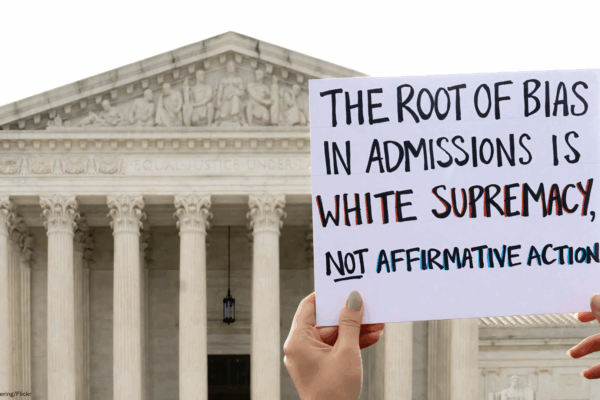LAS VEGAS — Today, the U.S. Supreme Court issued two rulings in Students for Fair Admissions v. Harvard and Students for Fair Admissions v. UNC, restricting schools’ ability to fully address systemic racial inequalities that persist in higher education – and hindering the ability of a university to select its student body.
The court, however, recognized that the values of diversity are “commendable goals” and that schools can consider applicants’ own discussion of how race has affected their lives. Importantly, in the opinion by Chief Justice Roberts, the court emphasized that “nothing in this opinion should be construed as prohibiting universities from considering an applicant's discussion of how race affected his or her life, be it through discrimination, inspiration, or otherwise.”
Moving forward, universities can and should also examine and improve their policies and practices to expand opportunities, including broadening recruitment efforts to underserved communities, developing robust middle school and high school pipelines, increasing need-based support, and improving campus climate.
In Aug. 2022, the American Civil Liberties Union, the ACLU of Massachusetts, and the ACLU of North Carolina filed an amicus brief urging the Supreme Court to uphold universities’ ability to consider race in college admissions. In the brief, the ACLU argued that race-conscious admissions policies like affirmative action have helped address our country’s long history of discrimination and systemic inequality in education by increasing access for underrepresented groups who face systemic barriers to higher education. Additionally, a holistic, race-conscious admissions process is the extension of a university’s academic freedom to assemble a student body across all races and ethnicities.
ACLU of Nevada executive director Athar Haseebullah said:
“Today’s ruling is another troubling ruling from the United States Supreme Court. The movement against affirmative action is part of a larger effort to rewrite our nation’s history, erase the lived experiences of racial minorities, especially Black folks, and obstruct our full and equal participation in our democracy. Nevada’s colleges and universities are incredibly diverse, but underrepresented student groups should have access to opportunities at elite universities across America as well. It’s important to emphasize to our students that they may continue to discuss race and their lived experiences within the college admissions process. Nothing in today’s ruling should prevent universities from inquiring about and considering such experiences. Our nation’s future as a thriving, multiracial democracy depends on students having the freedom and opportunity to learn and work together. We must invest in pathways that increase access to opportunities for students across all races and ethnicities, and we need to commit to addressing discrimination and systemic racial inequalities that persist.”
Stay Informed
Sign up to be the first to hear about how to take action.
By completing this form, I agree to receive occasional emails per the terms of the ACLU’s privacy statement.
By completing this form, I agree to receive occasional emails per the terms of the ACLU’s privacy statement.


